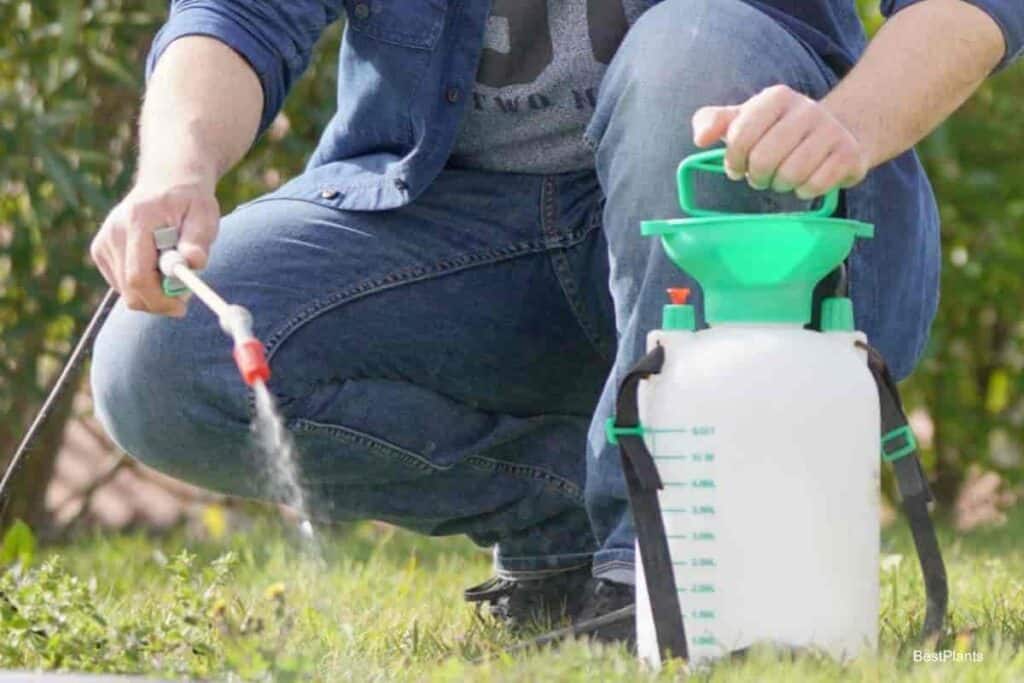In a word, “NO!”
Vinegar kills plants’ leaves, especially when applied on a hot, sunny day, but it will not kill the roots of mature plants. Suppose you can catch weeds when they have just sprouted and are under a couple of weeks old.

In that case, you might be able to kill them, roots and all, with a heavy drenching with white vinegar.
But once weeds have matured, you’ll need to use a more potent weed killer or use vinegar as part of a weed-killing regimen.
In this article, we share 10 questions and answers about using vinegar to kill weeds.
Vinegar As A Weed Killer Q&A
1. How Does Vinegar Work To Kill Weeds?
The acetic acid in vinegar desiccates (dries out) vegetation.
If you spray it onto unwanted vegetation on a hot, sunny day, the foliage should begin to wither and die within an hour or so.
While this may feel like a success, you can be sure the leaves will grow back fairly soon.
To keep weeds at bay using vinegar, you must repeatedly apply it.
2. Why Doesn’t Vinegar Kill Plant Roots?
Although vinegar destroys foliage in much the same way as glyphosate weed killers, it is not taken up and distributed throughout the structure of the plant as chemical weed killers are.
Instead, vinegar only kills what it touches, and sprayed on vinegar never makes its way to the roots.
3. If You Pour Vinegar On Soil, Will It Kill Weed Roots?
It might kill very young weed roots and damage established roots a bit, but for the most part, vinegar is an ineffective root killer.
Vinegar doesn’t last in the soil.
It dissipates within a couple of days in dry weather and disperses even more quickly during wet weather or in water.
If you soak the soil around weeds with 20% percent horticultural vinegar, it may remain in the soil for a month or so, but it will cause significant damage to the soil and still may not kill established weeds.
4. Is Vinegar A Safe Product?
Vinegar is a natural substance, but it is not entirely safe.
It can harm pollinators, valued plants, animals, and you.
The degree to which it causes harm is determined by the percentage of acetic acid it contains and the care you take in application.
5. What Kind Of Vinegar Is Strongest For Weed Killing?
White vinegar is about 5% percent acetic acid and is the safest type of vinegar to work with.
Apple cider vinegar (ACV) is a step up and contains about 7% percent acetic acid.
It’s still reasonably safe. Even so, it’s best not to apply either of these products during times when pollinators are active because it will harm them on contact.
Very early morning application will work well.
Horticultural vinegar is 20% percent acetic acid and is just as dangerous to work with as any chemical.
If you use this product, you must wear these to protect your nasal passages:
- Mask
- Goggles
- Rubber gloves.
You must also be careful not to let the product touch metal, wood, or concrete surfaces because it will damage them.
6. How Much More Effective Is Horticultural Vinegar?
Even though horticultural vinegar has a lot more acetic acid than kitchen vinegar and is more dangerous to handle, it isn’t a lot more effective as a weed killer.
If you spray it on foliage, the foliage will die back quickly.
Horticultural vinegar may also stunt or kill weed roots if you drench the soil.
If beneficial insects or animals contact any vinegar containing more than 11% percent acetic acid, they will be harmed or may die.
If you get it in your eyes, nose, or mouth, or on your skin, you may need to go to the emergency room.
All in all, the small boost in weed-killing power is not worth the risk. [source]
7. Is Vinegar An Organic Product?
If you buy vinegar specifically labeled as organic, it is organic.
Otherwise, it may be made from genetically modified crops (.e.g., corn) that have been designed to uptake glyphosate efficiently.
8. Is Vinegar Cheap To Use As A Weed Killer?
If you intend to have an organic weed killer, you’ll need to purchase organic vinegar, which is not cheap.
Additionally, when you use vinegar as a weed killer, you must apply it many times- even potent horticultural vinegar- so it may very well end up costing you much more than a chemical weed killer.
9. Can You Spray A Large Area With Vinegar?
You could do so, but you’d run the risk of damaging plants you want to keep.
Also, this is not an incredibly effective way to use vinegar as a weed killer, with one exception.
If you have winter weeds sprouting in your lawn and have a type of grass that dies back in the winter, such as:
- Zoysia
- Bermuda
- St. Augustine
You could spray vinegar to cause the winter weeds to subside without causing damage to your dormant grasses.
If you apply your first vinegar treatment late in the fall or early in the winter, when the weeds are just beginning to sprout, you may be able to kill off most of them, roots and all.
You’ll need to make several applications with this method to be sure of getting newcomers.
Wait 2 or 3 days between applications.
10. How Should You Use Vinegar As A Weed Killer?
Using household vinegar as a spot-on product as part of a weed-killing regimen is smart.
White vinegar and ACV can be safely painted or carefully sprayed directly onto young weeds that you want to kill.
You can pour either of these types of vinegar in the space between pavers to kill young weeds.
However, it doesn‘t have much staying power.
So you’ll need to reapply your vinegar treatment periodically.
Assemble Your Natural Weed Control Arsenal
Even though vinegar is not an exceptionally effective weed killer, it does have its place in natural weed control.
When you use it wisely, in combination with other natural weed control methods, such as:
- Ground covers
- Hand pulling
- Black plastic
- Mowing
- Hoeing
- Mulch
- Tarps
You can keep weeds at bay reasonably effectively.
